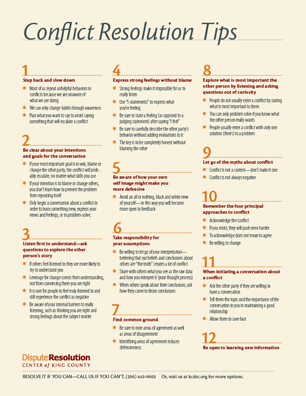Resolution Tips
Are you in the middle of a dispute?
These tips might be helpful

Tip 1:
Step back and slow down
- Most of us repeat unhelpful behaviors in conflicts because we are unaware of what we are doing
- We can only change habits through awareness
- Plan what you want to say to avoid saying something that will escalate a conflict
Tip 2:
Be clear about your intentions and goals for the conversation
- If your most important goal is to win, blame or change the other party, the conflict will probably escalate, no matter what skills you use
- If your intention is to blame or change others, you don’t learn how to prevent the problem from repeating itself
- Only begin a conversation about a conflict in order to learn something new, express your views and feelings, or to problem-solve.
Tip 3:
Listen first to understand—ask questions to explore the other person’s story
- If others feel listened to they are more likely to try to understand you
- Leverage for change comes from understanding, not from convincing them you are right
- It is rare for people to feel truly listened to and still experience the conflict as negative
- Be aware of your internal barriers to really listening, such as thinking you are right and strong feelings about the subject matter
Tip 4:
Express strong feelings without blame
- Strong feelings make it impossible for us to really listen
- Use “I-statements” to express what you’re feeling
- Be sure to state a feeling (as opposed to a judging statement) after saying “I feel”
- Be sure to carefully describe the other party’s behavior without adding evaluations to it
- The key is to be completely honest without blaming the other
Tip 5:
Be aware of how your own self image might make you more defensive
- Avoid an all or nothing, black and white view of yourself—in this way you will become more open to feedback
Tip 6:
Take responsibility for your assumptions
- Be willing to let go of your interpretation—believing that our beliefs and conclusions about others are “the truth” creates a lot of conflict
- Share with others what you see as the raw data and how you interpret it (your thought process)
- When others speak about their conclusions, ask how they came to those conclusions
Tip 7:
Find common ground
- Be sure to note areas of agreement as well as areas of disagreement
- Identifying areas of agreement reduces defensiveness
Tip 8:
Explore what is most important to the other person
- Listen and ask questions out of curiosity
- People do not usually enter a conflict by stating what is most important to them
- You can only problem solve if you know what the other person really wants
- People usually enter a conflict with only one solution (theirs) to a problem
Tip 9:
Let go of the myths about conflict
- Conflict is not a contest—don’t make it one
- Conflict is not always negative
Tip 10:
Remember the four principal approaches to conflict
- Acknowledge the conflict
- If you resist, they will push even harder
- To acknowledge does not mean to agree
- Be willing to change
Tip 11:
When initiating a conversation about a conflict
- Ask the other party if they are willing to have a conversation
- Tell them the topic and the importance of the conversation to you in maintaining a good relationship
- Allow them to save face
Tip 12:
Be open to learning new information

